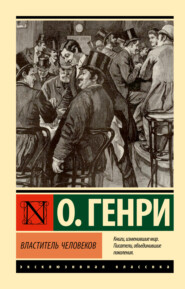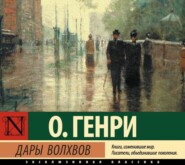По всем вопросам обращайтесь на: info@litportal.ru
(©) 2003-2025.
✖
Лучшие рассказы О. Генри = The Best of O. Henry
Настройки чтения
Размер шрифта
Высота строк
Поля
One with a white hat plume curving to the shoulder touched his sleeve, and cast at the others a triumphant look that said: “See what I can do with him?” and added her queen’s command to the invitations.
“I leave you to imagine,” said Morley, pathetically, “how it desolates me to forego the pleasure. But my friend Carruthers, of the New York Yacht Club, is to pick me up here in his motor car at 8.”
The white plume tossed, and the quartet danced like midges around an arc light down the frolicsome way.
Morley stood, turning over and over the dime in his pocket and laughing gleefully to himself. “‘Front,’” he chanted under his breath; “‘front’ does it. It is trumps in the game. How they take it in! Men, women and children – forgeries, water-and-salt lies – how they all take it in!”
An old man with an ill-fitting suit, a straggling gray beard and a corpulent umbrella hopped from the conglomeration of cabs and street cars to the sidewalk at Morley’s side.
“Stranger,” said he, “excuse me for troubling you, but do you know anybody in this here town named Solomon Smothers? He’s my son, and I’ve come down from Ellenville to visit him. Be darned if I know what I done with his street and number.”
“I do not, sir,” said Morley, half closing his eyes to veil the joy in them. “You had better apply to the police.”
“The police!” said the old man. “I ain’t done nothin’ to call in the police about. I just come down to see Ben. He lives in a five-story house, he writes me. If you know anybody by that name and could” —
“I told you I did not,” said Morley, coldly. “I know no one by the name of Smithers, and I advise you to” —
“Smothers not Smithers,” interrupted the old man hopefully. “A heavy-set man, sandy complected, about twenty-nine, two front teeth out, about five foot” —
“Oh, ‘Smothers!’” exclaimed Morley. “Sol Smothers? Why, he lives in the next house to me. I thought you said ‘Smithers.’”
Morley looked at his watch. You must have a watch. You can do it for a dollar. Better go hungry than forego a gunmetal or the ninety-eight-cent one that the railroads – according to these watchmakers – are run by.
“The Bishop of Long Island,” said Morley, “was to meet me here at 8 to dine with me at the Kingfishers’ Club. But I can’t leave the father of my friend Sol Smothers alone on the street. By St. Swithin, Mr. Smothers, we Wall Street men have to work! Tired is no name for it! I was about to step across to the other corner and have a glass of ginger ale with a dash of sherry when you approached me. You must let me take you to Sol’s house, Mr. Smothers. But, before we take the car I hope you will join me in” —
An hour later Morley seated himself on the end of a quiet bench in Madison Square, with a twenty-five-cent cigar between his lips and $140 in deeply creased bills in his inside pocket. Content, light-hearted, ironical, keenly philosophic, he watched the moon drifting in and out amidst a maze of flying clouds. An old, ragged man with a low-bowed head sat at the other end of the bench.
“I leave you to imagine,” said Morley, pathetically, “how it desolates me to forego the pleasure. But my friend Carruthers, of the New York Yacht Club, is to pick me up here in his motor car at 8.”
The white plume tossed, and the quartet danced like midges around an arc light down the frolicsome way.
Morley stood, turning over and over the dime in his pocket and laughing gleefully to himself. “‘Front,’” he chanted under his breath; “‘front’ does it. It is trumps in the game. How they take it in! Men, women and children – forgeries, water-and-salt lies – how they all take it in!”
An old man with an ill-fitting suit, a straggling gray beard and a corpulent umbrella hopped from the conglomeration of cabs and street cars to the sidewalk at Morley’s side.
“Stranger,” said he, “excuse me for troubling you, but do you know anybody in this here town named Solomon Smothers? He’s my son, and I’ve come down from Ellenville to visit him. Be darned if I know what I done with his street and number.”
“I do not, sir,” said Morley, half closing his eyes to veil the joy in them. “You had better apply to the police.”
“The police!” said the old man. “I ain’t done nothin’ to call in the police about. I just come down to see Ben. He lives in a five-story house, he writes me. If you know anybody by that name and could” —
“I told you I did not,” said Morley, coldly. “I know no one by the name of Smithers, and I advise you to” —
“Smothers not Smithers,” interrupted the old man hopefully. “A heavy-set man, sandy complected, about twenty-nine, two front teeth out, about five foot” —
“Oh, ‘Smothers!’” exclaimed Morley. “Sol Smothers? Why, he lives in the next house to me. I thought you said ‘Smithers.’”
Morley looked at his watch. You must have a watch. You can do it for a dollar. Better go hungry than forego a gunmetal or the ninety-eight-cent one that the railroads – according to these watchmakers – are run by.
“The Bishop of Long Island,” said Morley, “was to meet me here at 8 to dine with me at the Kingfishers’ Club. But I can’t leave the father of my friend Sol Smothers alone on the street. By St. Swithin, Mr. Smothers, we Wall Street men have to work! Tired is no name for it! I was about to step across to the other corner and have a glass of ginger ale with a dash of sherry when you approached me. You must let me take you to Sol’s house, Mr. Smothers. But, before we take the car I hope you will join me in” —
An hour later Morley seated himself on the end of a quiet bench in Madison Square, with a twenty-five-cent cigar between his lips and $140 in deeply creased bills in his inside pocket. Content, light-hearted, ironical, keenly philosophic, he watched the moon drifting in and out amidst a maze of flying clouds. An old, ragged man with a low-bowed head sat at the other end of the bench.
Вы ознакомились с фрагментом книги.
Приобретайте полный текст книги у нашего партнера:
Приобретайте полный текст книги у нашего партнера:

















